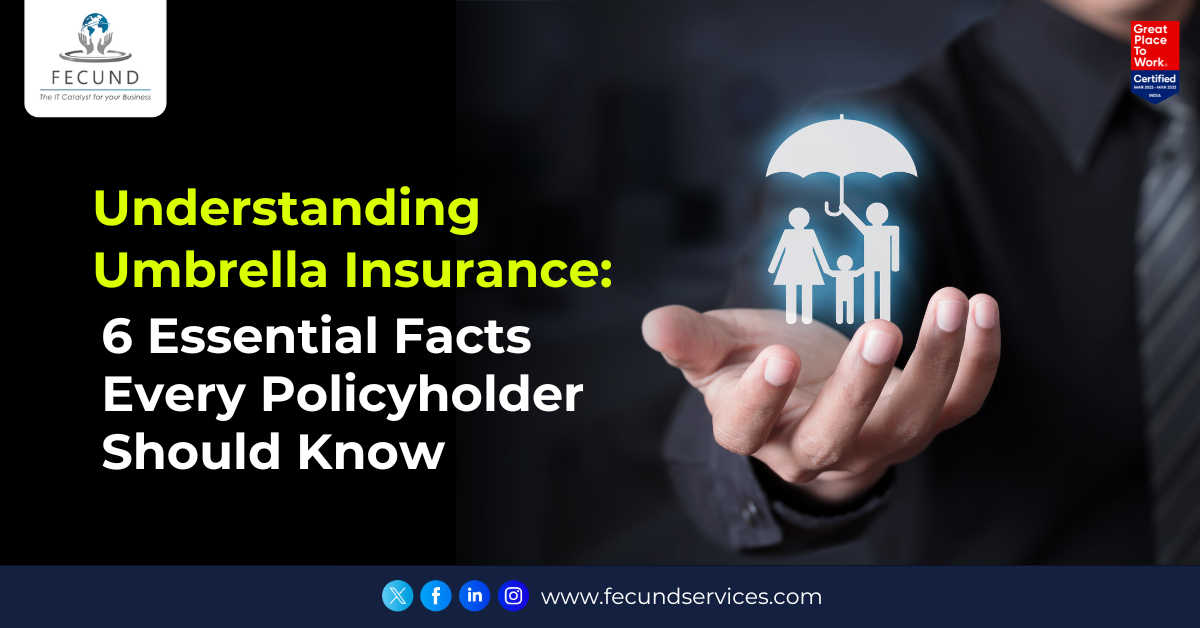
In today’s unpredictable world, accidents, lawsuits, and unexpected events are all too common—and they can be financially devastating. While most people understand the importance of having home, auto, or renters insurance, fewer realize that their existing liability coverage might not be enough when disaster truly strikes.
That’s where umbrella insurance comes in. Often misunderstood and underutilized, umbrella policies provide crucial protection against large and potentially ruinous liability claims. This blog explores six key things you need to know about umbrella insurance, including why it might be one of the smartest additions to your insurance portfolio.
-
What Is Umbrella Insurance—and How Does It Work?
Umbrella insurance is a secondary liability insurance policy that sits “on top of” your existing policies—like home, auto, or boat insurance. If you’re found legally responsible for damages or injuries and your primary coverage maxes out, the umbrella policy kicks in to cover the rest, up to its own limit.
For example, if you’re involved in a serious car accident and found liable for $1.2 million in damages, but your auto insurance only covers $500,000, your umbrella policy can step in to cover the remaining $700,000.
Umbrella insurance isn’t just about added money—it’s about added security. It ensures that a catastrophic event doesn’t wipe out your savings, investments, or even your future income.
-
Umbrella Insurance Covers More Than Just Accidents
Most people associate umbrella policies with auto accidents or homeowners’ liability, but its coverage is often broader than expected. It can help cover:
- Legal fees in a lawsuit
- Injuries on your property (even if you weren’t negligent)
- False arrest, defamation, libel, or slander claims
- Malicious prosecution
- Landlord liability for rental properties
In short, umbrella insurance doesn’t just protect your assets—it protects your reputation and livelihood, especially in today’s litigation-heavy society.
-
It’s an Add-On—Not a Standalone Policy
One of the most important things to know is that umbrella insurance requires you to maintain certain levels of underlying coverage. Typically, insurers require:
- Auto liability: $250,000 per person / $500,000 per accident
- Homeowners liability: $300,000 minimum
If you don’t carry these base levels, the umbrella policy won’t activate. In some cases, you may be required to upgrade your primary policies before qualifying for umbrella protection.
Also, umbrella insurance only covers incidents that are first denied or exhausted by your base policy. It’s designed to extend—not replace—your existing coverage.
-
It’s More Affordable Than You Might Expect
Despite offering millions in protection, umbrella insurance is remarkably affordable. For most individuals:
- $1 million in coverage costs around $150–$300 per year
- Each additional million typically adds $75–$100 annually
That means you could get $5 million in extra liability protection for under $600 per year—less than the price of a weekend getaway. The affordability stems from the fact that umbrella policies only pay out in rare, catastrophic events.
For families with teenage drivers, high-value homes, or rental properties, this low-cost coverage can be a financial lifesaver.
-
It’s a Must for High-Risk Lifestyles and Careers
Some people are more likely to be involved in situations that could trigger a lawsuit. If any of the following apply to you, umbrella insurance should be on your radar:
- Teenage drivers on your auto policy
- You own a swimming pool, trampoline, or dog
- You host guests regularly at your home
- You own a rental property
- You’re a high-profile professional or public figure
- You volunteer, coach, or sit on a nonprofit board
- You travel frequently or live abroad
These situations increase liability risk, and standard insurance limits may not suffice in case of legal action. An umbrella policy ensures that a single incident doesn’t result in financial ruin.
-
It Safeguards Your Future, Not Just Your Present
A common misconception is that umbrella insurance only protects existing assets. In reality, it can also shield your future income and financial opportunities. If you lose a major lawsuit and don’t have enough coverage, the court may allow the plaintiff to garnish your wages or seize investments and property.
Imagine losing a lawsuit at age 35 for $2 million without umbrella insurance. That judgment could follow you for decades—impacting your ability to own property, save for retirement, or even change jobs.
By paying a small premium today, you’re protecting decades of future earnings.
Bonus: What Umbrella Insurance Doesn’t Cover
While it’s broad in scope, umbrella insurance has its limits. It generally doesn’t cover:
- Damage to your own property (you need home or auto insurance for that)
- Business-related liabilities (you need separate business liability coverage)
- Intentional or criminal acts
- Contracts you willingly enter into
- War or nuclear events (yes, seriously)
Always read your policy carefully and ask your agent to clarify exclusions based on your lifestyle and assets.
How Much Umbrella Insurance Do You Need?
There’s no one-size-fits-all answer, but a common guideline is to get enough to cover your net worth + future income potential. For example:
- If you have $500,000 in assets and earn $100,000/year, a $1–2 million umbrella policy may be appropriate.
- If you’re a high-earner with investments, real estate, or public visibility, consider a $5 million policy or more.
Consulting with an independent insurance advisor can help tailor your coverage to your specific risk profile.
Conclusion: A Small Policy With Big Protection
In a world where million-dollar lawsuits aren’t uncommon and social media can amplify risks overnight, umbrella insurance provides a valuable extra layer of security. Whether you’re a parent, landlord, business executive, or simply a responsible homeowner, this affordable policy can offer peace of mind when you need it most.
For less than the cost of a dinner out each month, you can protect your home, future, and family legacy from life’s big surprises. That’s not just smart insurance—it’s smart living.
Check for the latest updates on our CoreOptimize Services, feel free to contact us at info@fecundservices.com!


